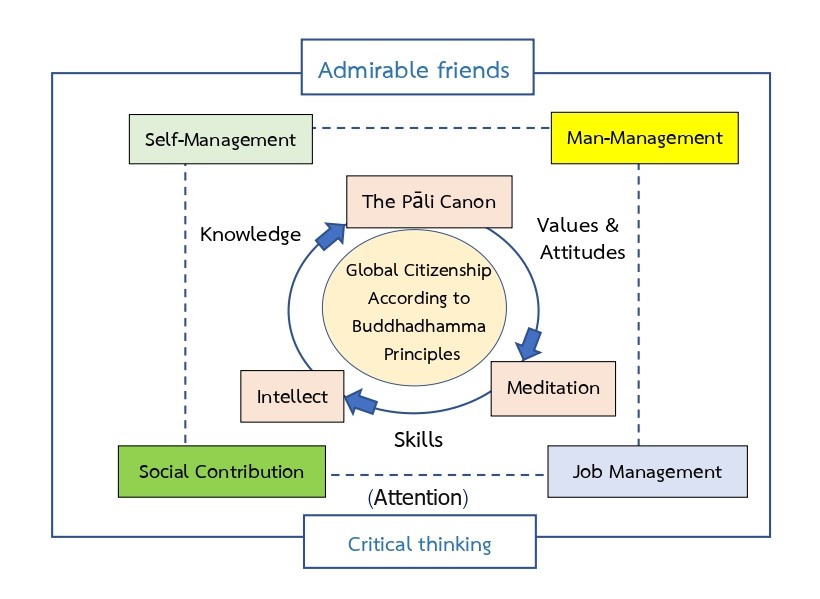GUIDELINES FOR PROMOTING GLOBAL CITIZENSHIP AMONG YOUTH BASED ON BUDDHADHAMMA PRINCIPLES
Keywords:
Youth, Global Citizenship, Buddhadhamma PrinciplesAbstract
Background and Objectives: Human resource development is one of the fundamental mechanisms that will drive the country toward its goals. A society must be able to present human resource-based theories for developing human potentiality in order to become a major force in country development. Agencies and organizations in every sector must be prepared in every guideline. At least the aspect of development must cover three important dimensions: first, "planting" or human resource development; second, harvesting. or management, that is, creating incentives for human resources to use their full potential to develop the work assigned to them based on the mission It has meaning including non-monetary motivation but motivation that has intangible value but has high sentimental value; third “taking the action,” to achieve result to build success and new value for oneself and organization. Buddhadhamma principles emphasize education and potential development, leading to becoming perfect human beings and living happily in a global society. The objectives of this research paper are; To study the guidelines to promote youth to become global citizens based on the Buddhadhamma principles and propose the guidelines to promote global citizenship among youth based on the Buddhadhamma principles.
Methodology: This qualitative research analyzed data from documents and research tools, including structured interviews, group discussions, in-depth interviews, knowledge management, and lesson learned.
Main Results: Promoting global citizenship among youth based on the Buddhadhamma principles found that: 1) Buddhism had a prominent point on the education aspect for improving the quality of life to become complete human beings. Buddhadhamma principles for promoting youth included: first, the Trisikkha principle; second, the Sappurisa-dhamma principles; third, the Kalyāṇamitta-dhamma principles; fourth, the Brahmavihāra principles; fifth, the Iddhipāda principles; sixth, the Saṅgahavatthu principles. 2) Regarding the suggestions for promoting global citizenship among youth according to Buddhadhamma principles, they should have contained essential skills, which included: first, the understanding of the cultural diversity of global societies; second, the understanding of the context of global society and its changes; third, the skills in analyzing, evaluating, and selecting information from the media; fourth, the discipline in self-development.
Involvement to Buddhadhamma: Promoting global citizenship is a continuous process of learning and development. The main aim is to be a good citizen and live happily together by applying Buddhism to the changes of the world which consists of six principles, namely the Trisikkha principle, the Sappurisa-dhamma principle, principles of Kalyāṇamitta-dhamma, the Brahmavihara principle, the Iddhipāda principle, and the Saṅgahavatthu principle are Buddhadhamma principles. They are principles intending to develop the potential of individuals to be complete in physical, verbal, mental, social, and spiritual, including for happy coexistence in a global society.
Conclusions: The body of knowledge from this study reflected the Buddhadhamma principles of humanity empowerment that encompassed four goals, which included self-development, man-management, job management, and social contribution. The entire body of knowledge would have created peace and happiness covering all dimensions of life, especially as the basis of Thai society and the culture of Thai persons.
References
Chaiyayotha, D. (2019). Textbook, basic subject, Buddhism, Grade 4-6 secondary school. (11th ed.). Thai Rome Kloa co., Ltd.
Crawford, E. O. (2013). Exploring Our Roles as Global Citizens: an Educator's Guide (Grades 3-5). TeachUNICEF.
In-depth Executive Interview. (2022). Guidelines for promoting global citizenship among youth based on buddhadhamma principles. (Nilkote, R., Interviewer)
In-depth interview with Project Leader. (2022). Guidelines for promoting global citizenship among youth based on buddhadhamma principles. (Nilkote, R., Interviewer)
Ministry of Education. (2008). Basic Education Core Curriculum. B.E. 2551. Agricultural Cooperative.
National Education Act B.E. 1999. (1999). Royal Gazette. Volume 116, Chapter 74 g. Page 5.
Office of Academic and Educational Standards. (2022). Physical Education: Subject and Learning Objectives. Kaew Chao Chom Media and Publishing Center Suan Sunandha Rajabhat University.
Office of the Education Council. (2018). Global Citizenship Promotion Research Report: International Experience. Prikwarn Graphic co., Ltd.
Office of the Education Council. (2021). Proposes a learning system that responds to the future changes in the year 2040. Office of the Education Council.
Phra Brahma Pandit (Dhammacitto, P.). (2019). Religion and the Sustainable Development Goals (SDGs). (2nd ed.). Amarin Printing & Publishing Public Co., Ltd.
Project Leader Interview. (2022). Guidelines for promoting global citizenship among youth based on buddhadhamma principles. (Nilkote, R., Interviewer)
Rattanamuk, S. (2008). Volunteer Management System Case Study: Tzu Chi Foundation, Taiwan. (2nd ed.). Center for Promotion and Development of Moral Empowerment (Moral Center) Office of Knowledge Management and Development (Public Organization).
Sinlarat, P. (2017). Before School 4.0: Creative School. (2nd ed.). Chulalongkorn University Printing House.
Somdet Phra Buddhakhosachan (P. A. Payutto). (2016). Buddhadharma (original version). (31st ed.). Buddhist printing house of the Dhammasapa.
Wiwattananon, S. (2017). Philosophy of Thai Education according to His Majesty's initiatives His Majesty King Bhumibol Adulyadej, Rama IX (Complete Education). Chulalongkorn University Book Center.
Youth Representative In-depth Interview. (2022). Guidelines for promoting global citizenship among youth based on buddhadhamma principles. (Nilkote, R., Interviewer)

Downloads
Published
How to Cite
Issue
Section
License
Copyright (c) 2023 Journal of Buddhist Anthropology

This work is licensed under a Creative Commons Attribution-NonCommercial-NoDerivatives 4.0 International License.








